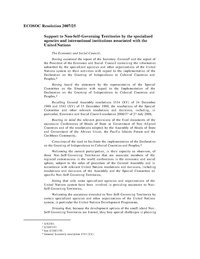
Back العهد الدولي الخاص بالحقوق الاقتصادية والاجتماعية والثقافية Arabic Pautu Internacional de Derechos Económicos, Sociales y Culturales AST İqtisadi, sosial və mədəni hüquqlar haqqında beynəlxalq pakt Azerbaijani Internasyunal na Tipan sa Ekonomiko, Sosyal, asin Kultural na mga Karapatan BCL Міжнародны пакт аб эканамічных, сацыяльных і культурных правах Byelorussian Международен пакт за икономически, социални и културни права Bulgarian Pacte Internacional dels Drets Econòmics, Socials i Culturals Catalan Mezinárodní pakt o hospodářských, sociálních a kulturních právech Czech Cyfamod Rhyngwladol ar Hawliau Economaidd, Cymdeithasol a Diwylliannol Welsh Den internationale konvention om økonomiske, sociale og kulturelle rettigheder Danish
 Parties and signatories to the ICESCR: signed and ratified signed but not ratified neither signed nor ratified | |
| Type | United Nations General Assembly Resolution |
|---|---|
| Drafted | 1954 |
| Signed | 16 December 1966[1] |
| Location | United Nations Headquarters, New York City |
| Effective | 3 January 1976[1] |
| Signatories | 71 |
| Parties | 172 |
| Depositary | Secretary-General of the United Nations |
| Languages | French, English, Russian, Chinese, Spanish and Arabic[2] |
| Full text at | |

The International Covenant on Economic, Social and Cultural Rights (ICESCR) is a multilateral treaty adopted by the United Nations General Assembly (GA) on 16 December 1966 through GA. Resolution 2200A (XXI), and came into force on 3 January 1976.[1] It commits its parties to work toward the granting of economic, social, and cultural rights (ESCR) to all individuals including those living in Non-Self-Governing and Trust Territories. The rights include labour rights, the right to health, the right to education, and the right to an adequate standard of living. As of February 2024, the Covenant has 172 parties.[3] A further four countries, including the United States, have signed but not ratified the Covenant.
The ICESCR (and its Optional Protocol) is part of the International Bill of Human Rights, along with the Universal Declaration of Human Rights (UDHR) and the International Covenant on Civil and Political Rights (ICCPR), including the latter's first and second Optional Protocols.[4]
The Covenant is monitored by the UN Committee on Economic, Social and Cultural Rights.[5]
- ^ a b c "International Covenant on Economic, Social and Cultural Rights". www.refworld.org.
- ^ "EISIL International Covenant on Economic, Social and Cultural Rights". www.eisil.org. Archived from the original on 3 March 2016. Retrieved 18 August 2014.
- ^ "UN Treaty Collection: International Covenant on Economic, Social and Cultural Rights". UN. 3 January 1976.
- ^ "Fact Sheet No.2 (Rev.1), The International Bill of Human Rights". UN OHCHR. June 1996. Archived from the original on 13 March 2008. Retrieved 2 June 2008.
- ^ "Committee on economic, social and cultural rights". www.ohchr.org.